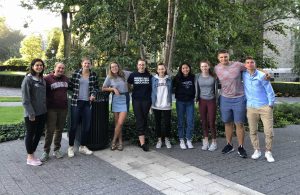By Melissa Leone

This past Thursday, the United Student Government Sustainability Committee in collaboration with Residence Hall Association (RHA) and Residential Life finalized positions for Eco-Representatives. An entirely new position at Fordham, Eco-Reps will aid in connecting and educating students on campus in order to promote sustainable living and environmental consciousness. For the past three to four years, members of the USG Sustainability Committee, including Alexis Neffinger, FCRH ’18, and Katie Sitler-Elbel, FCRH ’18, had worked to install eco-reps and partnered with RHA during spring 2018 to officially jumpstart the program.
“Eco-Reps are a way to connect and educate students that live on campus to realize the impact that their living habits have on the environment and on our community as a whole,” said Alexandra Sottile, FCRH ’19.
Sottile served as the USG Sustainability Committee representative, helping oversee applications for eco-reps and working with RHA to finalize the program. Applicants were required to complete a survey asking how they would define sustainability, how they would improve environmental friendliness on campus and how they would incorporate fun initiatives to get students involved. The committee received 48 applications in total across all 13 residence halls. Due to budget cuts, 23 were selected and one to three eco-reps are currently stationed in each of the 13 residence halls on Rose Hill’s campus.
Across all applications, common goals among prospective eco-reps included providing more outlets to practice sustainability, such as placing recycling bins next to all trash bins on campus and increasing signage within residence halls that outline what can and cannot be recycled.
“These actions go hand-in-hand with Fordham’s status as an Ashoka Changemaker University because they take into consideration innovation at the personal level,” said Sottile. “It’s seeing how we can take unconscious actions of our everyday lives and not let those actions be harmful.”
The initiative also aligns with the mission of the Society of Jesus to place precedence on nature and our community as a whole.
Eco-reps are also concerned with move-in and move-out protocol.
“It’s disheartening because there are so many items [in trash rooms] that could either be donated or recycled, but they are forgotten about and left to go to the landfill,” said Sara Chesnos, GSB ’19.
As communications director of RHA, Chesnos also highlighted the importance of persuasive programming to encourage students to participate in eco-friendly practices. In working with the USG Sustainability Committee, RHA will help eco-reps organize programming that is appealing to all students on campus.
“The goal for upperclassmen is to really hit home with sustainable practices for their futures in order to reduce their ecological footprint,” said Chesnos.
Mackenzie Norton, FCRH ’20, an eco-rep for Campbell Hall, said one of her goals is to make sustainability more practical, especially in upperclassmen dorms. Programs such as making your own laundry detergent or learning more about vegan diets are just some ways in which Norton plans on fulfilling her eco-rep responsibility, challenging her peers and encouraging students to keep these practices for years to come.
“Every little reminder you can receive to do something small can be such a great help,” said Norton.
Having students occupy eco-rep positions will also make sustainable living more relatable. Audrey O’Brien, FCRH ’22, an eco-rep for Loschert Hall, plans to create flyers to advertise events and detail objects that can be recycled. Recyclemania, a competition across the United States and Canada, calls for students to log the amount of recyclables in their residence halls over an eight-week period.
Universities are then ranked based on which has the best recycling rate in comparison to their total waste output. O’Brien mentioned that hosting competitions such as Recyclemania, as well as clothing drives and monthly excursions to thrift shops will encourage students to live sustainably.
“Eco-reps are important to have on campus so that we can reinforce the ideas of sustainability and so that we can have fellow peers that will encourage these practices,” said O’Brien.
Other responsibilities of eco-reps include attending USG Sustainability Committee meetings, providing one sustainable programming activity per month, serving as a resource for electronic waste disposal and helping during move-in and move-out days to minimize improper waste disposal. In the future, some eco-reps said they hope to collaborate with St. Rose’s Garden, Fordham’s on-campus community garden, to establish a composting system that would be available to all interested students.
Although there are many students that currently utilize the garden for composting, some eco-reps said they hope to increase student involvement by initiating walk-overs and perhaps even creating drop-off and pick-up compost stations. Eco-reps within each residence hall will also maintain joint social media accounts to promote various events throughout the year, including Sustainability Week which will last from Monday, Oct. 15 to Friday, Oct. 19.
“We’re looking to make eco-reps something that’s permanent within Fordham’s system,” said Sottile. “We’re in the hand-holding stages right now, but this initiative has so much promise and will initiate so much change on Fordham’s campus.”








































































































































































































